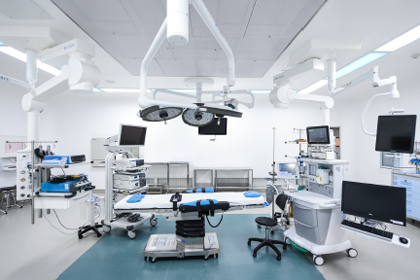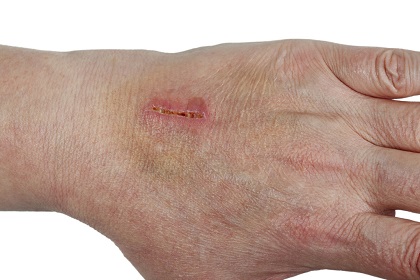Search
When you have surgery, highly skilled professionals will care for you. Beforehand, learn what to expect and how to prepare. This helps you relax, and may speed your recovery. Read this booklet and ask questions to learn more.
1. Before Surgery
Talking with your Doctor
Your doctor will help you learn about your surgery. Make a list of questions to ask. Your list might include these:
• How do I prepare for surgery?
• What day and time do I arrive?
• Where do I check in?
• Are there any documents or forms that I need to bring along?
• How long will I be in surgery?
• When can I see my family?
Your Pre-op Exam
Your doctor will ask you about your medical history, do a physical exam, and order some tests. It may include:
• Blood tests, which provide information about your blood and body chemistry
• An ECG (electrocardiogram) records how your heart functions
• A urinalysis (analysis of your urine) gives information about your kidneys and bladder
• A chest X-ray shows an image of your lungs
• Other tests may also be done
If you have results from those or other tests at home, bring them with you when you check in for surgery. Without them, your surgery may be delayed or cancelled.
Preparing for Surgery
Follow your doctor's instructions before surgery. Use the checklists at the end of this booklet. And follow these guidelines:
• Tell your doctor about any medications you take, including aspirin, herbs, or vitamins. Ask if you should continue taking them
• If you smoke, make a plan to quit or cut down
• Ask your doctor if you will need a blood transfusion during surgery and if so, how to prepare for it
• If you are having abdominal surgery, ask what you need to do to clear your bowel
The Night Before Surgery
• If instructed, wash with antibacterial soap where the incision will be made. Hair on this area will be shaved or trimmed at the hospital
• Follow your surgeon's instruction for fasting before surgery
• Don't smoke
• If you've been told to keep taking a medication, take it with small sips of water
Arriving for Surgery
Bring your insurance documents and any forms you need with you. When you check in, you will get an ID bracelet and be taken to a room to get ready. Your family and friends may be asked to stay in a waiting area.
Anesthesia
If anesthesia is required, the anesthesiologist will talk with you about anesthesia (medicine to block pain and keep you comfortable during surgery) before surgery begins.
2. Going into Surgery
Before surgery, you may be given medication to relax yourself. You may be taken on a stretcher or in a wheelchair to an operating room. Along the way, you may notice other patients, surgical staff, or equipment.
In the Operating Room
The operating room (OR) is staffed by a team of highly-trained professionals. The OR provides the most sterile and safe surgical setting possible. Your surgical team usually includes the following members:
• A surgeon, responsible for your overall care, will lead your surgical team
• A surgical assistant may help on many major surgeries
• An anesthesiologist provides anesthesia or medication, and monitors vital signs
• A scrub nurse sets up instruments and assists the surgeon
• A circulating nurse prepares the OR, makes sure sterile methods are followed, and helps other team members
The Equipment
• An IV (intravenous line) will be used to provide fluids to your body, or give you medication or blood. An IV feels like a pinprick when it is inserted
• Monitors show your vital signs (blood pressure, heart rate, heart rhythm, etc.)
• An electrocardiography records your heart functions. It is connected by wires to round sticky patches that are placed on your upper body
• A pulse oximeter is placed on your finger to monitor your blood's oxygen level
• Blood pressure cuff is placed on your arm to monitor your blood pressure
• There will be surgical lights overhead and other equipment around you in the room to help in your operation, and to make sure you are safe and comfortable
3. After Surgery
After surgery, you'll be brought to the post anesthesia care unit (PACU, or Recovery Room). You'll receive constant care from a post anesthesia care nurse. When you're coming out of surgery, you doctor may call or visit your family or friends to let them know how you're doing.
In the PACU
As the anesthetic wears off, you'll “wake up” in the PACU. Noises may sound louder than normal. You may have blurry vision, a dry mouth, chills or nausea. A nurse will check your dressing and blood pressure often. You may have an IV, or other tubes used for drainage. If the area operated on hurts or burns, ask your nurse for pain medication if you need it. You may be asked to do deep breathing and coughing to help clear your lungs. Your nurse may ask you to move around in bed, since even these small movements will help you recover faster.
After the PACU
The PACU nurse works with the anesthesiologist to decide when you can be moved from the PACU. It's often an hour or more after surgery.
If you're an inpatient, you'll be taken to your hospital room, where you'll stay for at least one night. Your family or friends may see you the same day as your surgery.
If you're an outpatient, you'll stay in the PACU to recover until discharge. Be sure to have an adult friend or family member drive you home after surgery.
4. Your Recovery
Your doctor and nurses will check on you after surgery. Follow your healthcare team's advice about walking, deep breathing, and eating. If you feel pain or nausea, tell them.
Walking
Walking helps your blood flow better. It also helps your body functions get back to normal. Be sure to have someone help you the first time you get out of bed, and when you begin walking.
Eating
Food may be hard to digest after surgery. So, you may have an IV for nutrition when you're in the hospital. When the doctor says you can begin eating, a dietitian or the nurse will help decide what foods are best for you. You'll start with liquids. Later, you'll eat solid foods. At home, follow your doctor's orders about eating and drinking.
Breathing and Coughing
In the hospital, you may be asked to use a spirometer for deep breathing exercise. Deep breathing clears the lungs and helps prevent pneumonia. This may be difficult at first. If you have an incision, holding a pillow over it when you cough can help.
Coping with Pain
You may receive pain medication in the hospital or be sent home with a prescription. Everyone has a different level of pain. So if you have pain or nausea, don't be afraid to ask your doctor or nurse for medication. Also let your doctor or nurse know if you have any side effects from the medication.
5. Going Home
Your doctor will let you know when you can go home. It is natural to wonder how you will care for yourself. Your doctor or nurse will give you guidelines. Be sure to ask them any questions you might have. Having support at home will help, too. Please contact your doctor if you experience any discomfort.
Looking Ahead
You're likely to spend most of your time recovering from surgery at home. Make sure to plan your home care. Also, you'll need to visit your doctor's clinic sometime after you leave the hospital. Be sure to keep these appointments. Below are some topics to discuss with your doctor or nurse before you go home.
• Pain control
• Medications
• Diet
• Bandages and dressings
• Bathing
• Stitches, staples, and incision care
• Signs of infection
• Home help
• Follow-up visits with doctors
• Driving and other activities
• Returning to work
Leaving the Hospital
A hospital staff member will take you to your car in a wheelchair. You won't be allowed to drive yourself home, so make sure you have an adult friend or family member available. At home, rely on family or friends. The more they know about your health and surgery, the more help they can provide you. Your nurse can talk to them about their questions and concerns.
Appendices:
A. Your Pre-Surgery Checklist
• Call your doctor if you have a change in your health. Even a cold or flu can delay your surgery
• If you'll be staying overnight, we will prepare personal toiletries, pajamas, robe, and slippers for you
• Bring a list of your medications (medication name, dosage, and how often you take them)
• Wear comfortable, loose clothing
• Remove dentures and all metallic materials on the body
• Leave valuables (cash, watch, jewelry, etc.) at home
• Remove all nail polish, lipstick, and other makeup before surgery
• Ask an adult friend or family member to drive you home
• Ensure that you have arranged to have people looking after you, providing you with everything you need once you return home
B. Checklist for Important Information
• Date and time of surgery
• Hospital
• Address
• Phone number
• Insurance
• Policy number
• Doctor's name
• Doctor's phone number
• Date and times of follow-up appointments
Click the link for more information on Surgery Clinical Service











